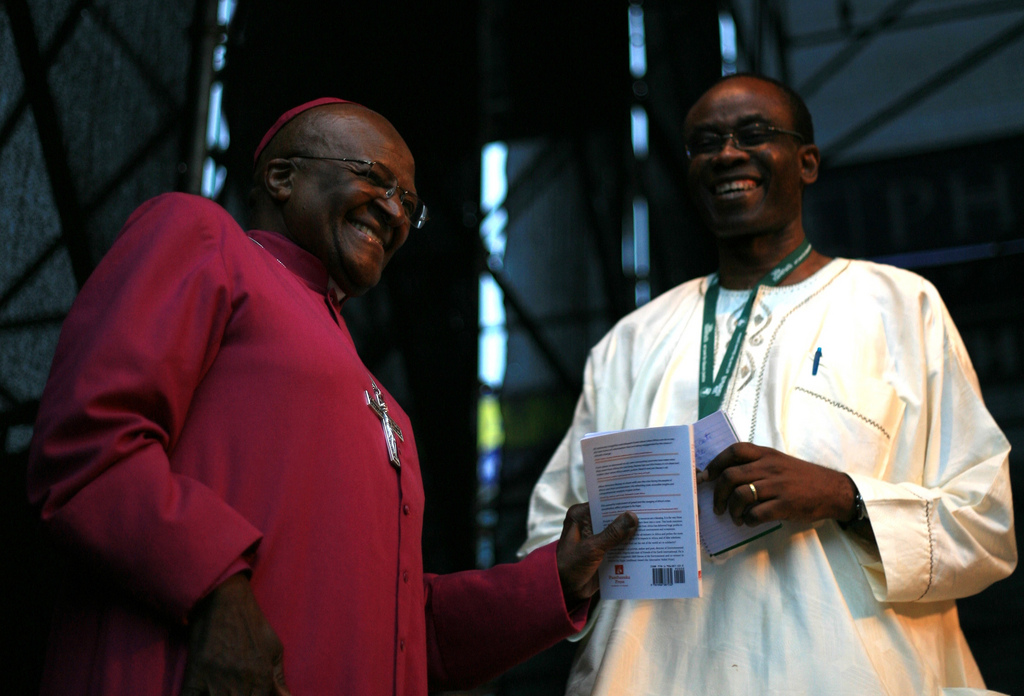
Durban climate talks begin with tragic deaths
The night before international climate negotiations began here in Durban on the coast of South Africa, a violent storm whipped through the city, collapsing houses and flooding buildings. In a tragic foretelling of the climate chaos to come, six people died when their homes collapsed. Thirteen people have died in extreme weather events in the last two weeks alone.
Unfortunately, the wealthy world continues to ignore the obvious and tragic reality of climate crisis. In addition to last night’s devastation, the world is already reeling from major humanitarian emergencies induced by climate change: floods in Pakistan, landslides resulting from extreme rains in multiple countries in Latin America, and the multi-year drought in the Horn of Africa that threatens the lives of millions.
Archbishop Desmond Tutu, alongside our very own Friends of the Earth International Chair, Nnimmo Bassey, said it best to the 15,000 people who braved the storm yesterday to attend a climate justice rally, “We have only one home. Whether you are rich or poor, this is the only home we have.”
And yet, the climate negotiations remain dangerously off track. A United Nations Environment Program report confirms that countries’ pledged emission reductions are too weak to avert dangerous climate change, and could cause warming in excess of a catastrophic 5°C. Warming in Africa and other large land-masses would occur at much higher levels, heralding impacts not experienced in the history of human civilization.
Now more than ever before, we have no time to waste. We need science-based, legally binding emission reductions from those historically responsible for creating the problem. Fortunately, four years ago, the whole world, including the U.S., agreed to an approach that covers 100 percent of global emissions and ensures sustainable development for the world’s people. It’s called the Bali Roadmap. It consists of a second commitment period of the Kyoto Protocol (the only legally binding international agreement to reduce emissions), comparable action for the United States (because they refused to sign up to the Kyoto Protocol and the world was feeling particularly conciliatory in 2007), and finance and technology for developing country climate action.
Despite some pretty serious hiccups along the way, (remember Copenhagen?), the task in Durban is to complete what we started in Bali four years ago.
Anyone following media reports would be forgiven for thinking that the main issue for the Durban climate conference is to agree on a new legally binding climate treaty. Rich countries have been actively conveying their message in the media, shaping public expectations that Durban should deliver a new treaty or at least a mandate for one.
The call for a new mandate for a new treaty in place of the Kyoto Protocol should be understood for what it really is — rich countries backtracking and reneging on inconvenient obligations, at the expense of the poor and the planet. As it has been throughout history, the rich and powerful are re-writing the rules in their favor.
The reality is that the United Nations Framework Convention on Climate Change and the Kyoto Protocol that make up the existing climate architecture desperately need to be implemented, not replaced. Developed countries appear progressive by asking for a legally binding treaty or the mandate for one, when the whole real truth is that they are violating the current legally binding regime, shifting the goal post agreed to in the Bali Roadmap, and reneging on agreements for a second commitment period of the Kyoto Protocol.
A new mandate locks in inaction for the next several years, time we simply do not have to save the planet.
Nelson Mandela, a brave and forceful advocate for what is right and what is necessary, said, “It is impossible until it is done.” Now is not the time to be swayed by political prognoses that would have us believe what is right is not possible; now is the time to fight bravely and forcefully for what must be done to save the planet.
Related Posts
Ways to Support Our Work

Read Latest News
Stay informed and inspired. Read our latest press releases to see how we’re making a difference for the planet.

See Our Impact
See the real wins your support made possible. Read about the campaign wins we’ve fought for and won together.

Donate Today
Help power change. It takes support from environmental champions like you to build a more healthy and just world.